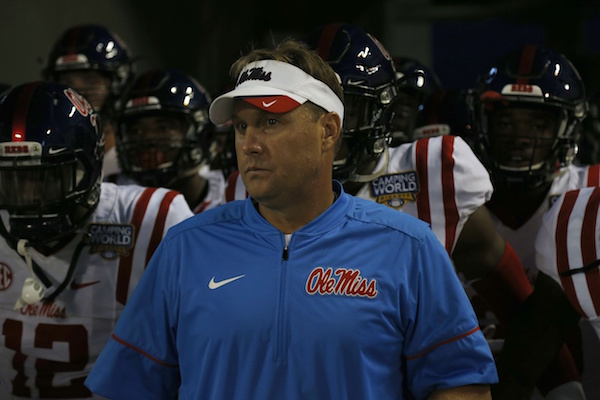
Not just Ole Miss: How other notable NCAA cases panned out in recent years
Dust-ups with the NCAA are nothing new for the SEC. In fact, they include five programs since 1990 outside of Ole Miss.
Ole Miss is simply the latest example of wayward boosters, assistant coaches and other staff members being tangled in a mess they couldn’t unwind and stay within NCAA rules. So far, Ole Miss has given up nine scholarships, imposed a bowl ban on itself for the upcoming season and made restrictions in other areas. That followed a seven-game suspension served last season by former offensive lineman Laremy Tunsil for accepting improper benefits.
Questions of institutional control are among the most damaging accusations, but the case is far from over.
The incidents brought back memories of Ole Miss infractions in 1986 and 1994, when the Rebels were found to have arranged transportation payments to recruits and provided use of a Ford Mustang. There were also photographs of a recruit at a Memphis strip club during official visits.
Among the host of penalties, including four years probation, loss of 24 scholarships over two years and a two-year postseason ban, the Rebels to this day remain the last major football program to receive a television ban.
The Gators were 9-2 in 1990 under Spurrier, but ineligible for the SEC title because of those NCAA sanctions.
Auburn, 1993: Another would-be title team held up by chains from a previous regime, the Tigers were hit with two years of probation, loss of 33 scholarships over three years, a two-year postseason ban and one-year TV ban. The reason? Auburn booster Corky Frost gave more than $4,000 in cash and things like steaks and tires for a car to defensive back Eric Ramsey.
Ramsey made several secret recordings of conversations, which were reported in and by the Birmingham News and Montgomery Advertiser, with Frost and Auburn assistant coach Larry Blakeney, who also provided cash to Ramsey from another booster.
Coach Pat Dye, who was also the school’s athletics director, was not directly implicated, but charged with lack of institutional control.
Auburn went 11-0 under first-year head coach Terry Bowden in 1993, but was ineligible for the SEC Championship because of NCAA sanctions.
Alabama, 2009, 2002, 1995: The 1993 Sugar Bowl was a case of Alabama jumping on Miami from the get-go and the Hurricanes couldn’t recover from an early 13-6 deficit when the Crimson Tide out-rushed Miami 152-6. The 34-13 result was summed up by cornerback Antonio Langham, who said the national championship was a shock.
“I expected it to be a whole lot tougher,” Langham was quoted as saying. “But we rattled them before they could think clearly.”
Shortly after the game, Langham took money from and signed with an agent, and an investigation later revealed that teammate and running back Gene Jelks told the NCAA that he took $24,000 in bank loans.
The Washington Post reported that Langham called coach Gene Stallings and told him he had changed his mind and did not want to forgo his senior season of eligibility to play in the pros. Stallings asked Langham if he had signed with an agent and Langham said he had not. Stallings then told Alabama Athletics Director Cecil “Hootie” Ingram of the situation, but neither thought a further investigation was necessary.
“I’m trying to help a player stay in school and do what he wants to do, with no attempt to cover up anything,” Stallings said, the Post reported. “Here’s a player who said, ‘I made a mistake. Can you help me?’ I asked him if there was any money involved, and he said there wasn’t. I’m not a detective. And I don’t want the NCAA to make a detective out of me.”
Put it all together and the Crimson Tide received two years of probation, a postseason ban and lost 13 scholarships for the 1995 class. Alabama forfeited eight wins that Langham played in in 1993. Ingram resigned after the incident, while Stallings went 8-3 and 10-3 the next two seasons. Langham went on to play seven seasons in the NFL with Cleveland.
Less than a decade later, in 2002, Memphis high school standout Albert Means and Alabama booster Logan Young crossed paths when Young said he would pay $150,000 to Means’ high school coaches to land Means at Alabama. It was the latest in a string of cases that began in the 1990s when boosters Wendell Smith and Ray Keller were charged with paying $20,000 to another standout, Kenny Smith, and Alabama linebacker Travis Carroll, who was given use of a car, before he transferred to Florida.
Alabama was placed on probation for five years, lost 21 scholarships over three years and received a two-year postseason ban.
The incident with the least amount of lingering sting came in 2009, Nick Saban’s first year. Football players, among athletes across campus, were reportedly obtaining textbooks for classes they weren’t enrolled in, and then giving them to friends or selling them. Five football players, including starting center Antoine Caldwell, were suspended four games of the 2008 season. Alabama was placed on probation for three years, and forced to vacate 21 victories from the 2005-07 seasons.
Kentucky, 2002: Memphis showed up again in the scandal headlines again when assistant coach Claude Basset paid $7,000 to high school coaches to swing recruiting. It ultimately led to an investigation that revealed several examples of academic fraud and recruiting improprieties throughout the athletics department. Coach Hal Mumme was charged with failure to monitor the program, and the Wildcats were barred from postseason in 2002, with three years of probation, and the loss of 19 scholarships over three years.
